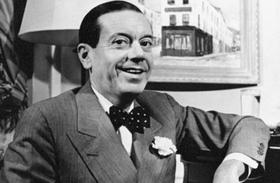Stories of Standards: “Love For Sale”

Tune in to Jazz with Victor Cooper – weekdays from 6-9 a.m. MT – for Stories of Standards to hear our favorite versions of this song all week long starting Monday, April 23!
Stories of Standards is sponsored by ListenUp – If you love music, you’ll love ListenUp.
Cole Porter wrote “Love For Sale” for the musical “The New Yorkers” in 1930, the same year that the neo-Puritan Hays Code debuted. Based on a book by Herbert Fields, cartoonist for “The New Yorker”, the musical satirized New York “types” from society matrons to con men and prostitutes. “Love For Sale” was introduced by Kathryn Crawford as May, a young prostitute with no apparent illusions about her job. Reaction to showing a white prostitute was strong enough that she was replaced by Elisabeth Welch, also changing the site from Reuben’s to Harlem’s Cotton Club. Critics found little middle ground in their reviews of this song, with some very appreciative of its frank realism and others seeing it as being in the most appalling bad taste. “Love For Sale” was banned from radio play, where in 1931 Libby Holman’s recording of it went to #5 and Fred Waring’s Pennsylvanians (who made their debut in the original musical) took it to #14.
“The New Yorkers” opened in Philadelphia before moving first to Newark, New Jersey, then to the Broadway Theatre in December 1930. In 1996 the Marriott Theatre in Lincolnshire, Illinois, staged a revival. “Musicals Tonight”, an off-off-Broadway company, presented it as a concert in April 2003. The “Lost Musicals” performed it at Sadler’s Wells Theatre, London, in 2009, and New York City Center staged it in March 2017 as part of their Encores! Staged concert series.
Cole Porter (1891-1964) wrote both melody and lyrics and in 2016 The Stage ranked him as #4 of the top 50 musical theatre composers of all time, based on the wit, style and sophistication of his words and delightful melodies. As the Songwriter’s Hall of Fame says: His musicals dominated Broadway from the 1930s to the 1950s. Amazingly, this held true even after an accident in 1937 led to intense pain for the rest of his life. Books, honors and two film biographies attest to the power of his life and music.
9(MDA3NDU1Nzc2MDEzMDUxMzY3MzAwNWEzYQ004))
Become a Member
Join the growing family of people who believe that music is essential to our community. Your donation supports the work we do, the programs you count on, and the events you enjoy.
Download the App
Download KUVO's FREE app today! The KUVO Public Radio App allows you to take KUVO's music and news with you anywhere, anytime!
